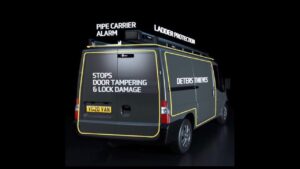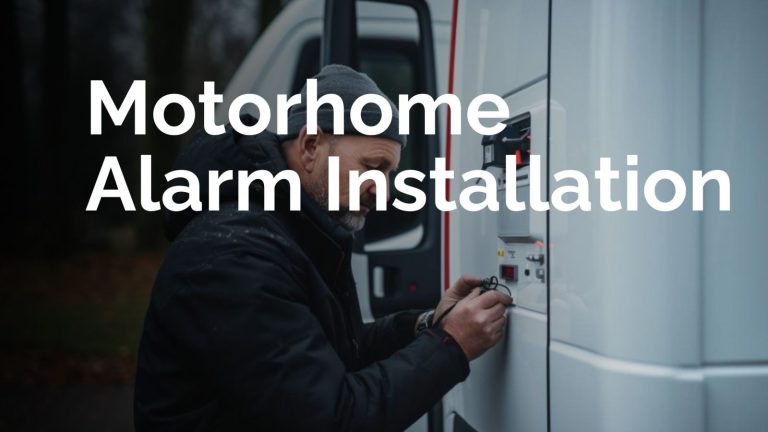

The security of your motorhome is of paramount importance, especially considering its high value and the potential for valuable items inside. This section aims to shed light on the risks associated with motorhomes and the benefits of installing an alarm system for enhanced security.
Motorhomes, due to their inherent value and the potential for pricey items inside, are attractive targets for thieves (Vanguardian). The risk of theft is a constant concern for many motorhome owners, creating a need for effective safeguarding measures. From the potential of stealing valuable personal belongings to the risk of the motorhome itself being stolen, the risks are varied and serious. It’s essential to take proactive measures to mitigate these risks and ensure the safety and security of your motorhome. For more information on motorhome theft prevention, visit our article on motorhome theft prevention.
A motorhome alarm system serves as an added layer of security, deterring thieves and alerting the owner to any unauthorised access or break-in attempts (RV Lifestyle). These systems can provide peace of mind and protection against theft, break-ins, and other security threats while travelling in an RV (Source).
Notably, motorhome alarm installation can help to deter thieves and protect your vehicle and possessions (Vanguardian). Should anyone attempt to access your motorhome without authorization, the alarm system will sound, potentially scaring off the intruder and alerting those nearby.
Investing in a security system for your motorhome is a smart idea that can provide peace of mind and protection, with various options available to suit different budgets (KOA).
For more detailed information on motorhome alarm systems and the features they offer, visit our article on motorhome alarm systems.
Motorhome alarm systems encompass a vast range of features designed to secure your vehicle against potential threats. Understanding these features can help you make an informed decision when considering a motorhome alarm installation.
Basic features of motorhome alarm systems are primarily designed to deter potential thieves and alert the owner to unauthorized access. These include:
Advanced features of motorhome alarms provide additional layers of security, offering more control to the owner and enhancing the overall efficacy of the system. These features include:
Implementing a robust motorhome security system with these features can significantly enhance the safety of your vehicle and provide peace of mind. Whether you prioritize basic or advanced features, it’s essential to choose a system that best fits your needs and preferences for motorhome theft prevention.
For motorhome owners, selecting a reliable alarm system like the Vanguardian is essential for robust security. The Vanguardian stands alongside top-rated systems such as the Arlo Pro 4.
The Arlo Pro 4 comes highly recommended for RVs, with its flexible angles and easy installation process. This system can be attached to the RV using 3M tape, making it removable, without causing damage (KOA).
The Getaway Couple, who have been full-time RVers for 3.5 years, swear by Arlo cameras for RV security. They specifically highlight the microphone feature as a useful tool for RV security (KOA).
| Alarm System | Price | Notable Features |
|---|---|---|
| Arlo Pro 4 | $299 | Angle flexibility, easy installation, microphone feature |
There are a variety of other motorhome alarm systems available in the market, with prices ranging from $12 to $500. Some of these systems offer advanced features such as integration with other smart home devices for remote monitoring and control via a smartphone app, and GPS tracking capabilities to locate the vehicle in case of theft (KOA, RV Lifestyle).
It’s important to choose a motorhome alarm system that is specifically designed for RV use, as they have unique features and requirements compared to traditional home security systems (Source).
| Alarm System | Price Range | Notable Features |
|---|---|---|
| Various Systems | $12 – $500 | Integration with smart home devices, GPS tracking |
The cost of these alarm systems can vary depending on the features and level of sophistication, ranging from a few hundred dollars to over a thousand dollars for top-of-the-line systems (RV Lifestyle).
When considering the motorhome alarm installation, it’s essential to take into account the features it provides, the ease of installation, and how well it fits into your budget. A well-chosen alarm system can greatly enhance your motorhome security system and contribute significantly to motorhome theft prevention.
With a heightened focus on motorhome security, installing a motorhome alarm system can offer peace of mind. There are two primary options for motorhome alarm installation: professional installation and self-installation. Each has its own set of benefits and considerations.
Professional installation is often recommended for motorhome alarm systems to ensure proper setup and integration with the RV’s electrical system. This maximises effectiveness and reliability (Source). Choosing a reputable and experienced professional is key to ensure proper installation and functionality (Vanguardian).
The cost of professional installation varies, depending on the type of alarm system chosen and the complexity of the installation. It’s important to get quotes from several installers to ensure you’re getting a fair price.
Remember, the costs associated with the installation and maintenance of the alarm system are often the responsibility of the owner. This includes potential costs for future maintenance or system updates.
For those who are more hands-on, self-installation can be a viable option. Many modern motorhome alarm systems are user-friendly and come with clear instructions for self-installation. These systems can be easily installed and removed, making them portable and convenient for use in different locations (Cove Smart).
When self-installing, make sure you:
Whichever installation method you choose, remember that the goal is to enhance your motorhome theft prevention efforts. An alarm system, whether it’s a motorhome door alarm or a more comprehensive system, is a key part of this.
When contemplating a motorhome alarm installation, it’s crucial to consider the various costs associated with different alarm systems and the potential impact on insurance premiums.
The cost of motorhome alarm systems can vary significantly, depending on the brand, features, and installation requirements (Cove Smart). Prices can range from as low as $12 to as high as $500 (KOA), and more sophisticated systems can cost over a thousand dollars (RV Lifestyle).
It’s worth noting that the complexity of the installation can also influence the overall cost. For instance, a basic motorhome door alarm may be quick and easy to install, incurring minimal additional costs, while a more comprehensive motorhome security system with multiple sensors and cameras may require professional installation, adding to the overall expense (Vanguardian).
| Alarm System Type | Price Range |
|---|---|
| Basic Motorhome Door Alarm | $12 – $50 |
| Advanced Motorhome Security System | $50 – $500 |
| Top-of-the-line Systems | Over $1000 |
In addition to the upfront cost of the alarm system and installation, it’s also worth considering the potential impact on your motorhome insurance premiums. The installation of a motorhome alarm system may result in lower insurance premiums, as it reduces the risk of theft and damage (Vanguardian).
Insurance companies often offer discounts to policyholders who take steps to improve the security of their motorhomes, recognising that a well-secured motorhome is less likely to be targeted by thieves. Therefore, while there is an initial cost involved in purchasing and installing a motorhome alarm system, this can potentially be offset by the savings made on your insurance premiums over time.
However, it’s important to consult with your insurance provider to understand how much of a discount you may be eligible for, as this can vary depending on the provider and the specific alarm system installed.
In conclusion, the cost of a motorhome alarm system and its installation can vary greatly, but the security benefits and potential insurance discounts make it a worthwhile investment for any motorhome owner. For more advice on motorhome theft prevention, explore our other articles.
When it comes to motorhome alarm installation, it’s essential to be aware of the legal requirements and standards that apply. These rules not only ensure the safety and protection of your motorhome, but also guarantee that your alarm system is compliant with national and local laws.
Motorhomes and recreational vehicles are required to have a smoke alarm installed in accordance with the National Fire Alarm and Signaling Code (NFPA 72). This code specifies the types of smoke alarms that should be used and their placement within the motorhome (NFPA).
The NFPA 72 code requires motorhomes to have a minimum of one smoke alarm in each sleeping area and within 10 feet of each sleeping room. Smoke alarms should also be installed in the vicinity of all cooking appliances, and in any other area where a fire is likely to start, such as the living area.
The code also specifies the type of smoke alarm that should be used. The smoke alarm should be a single station alarm that is listed for RV use and complies with UL 217. It should be powered by a battery or a combination of battery and household electric current.
In addition to smoke alarms, motorhomes are also required to have a carbon monoxide alarm installed in accordance with the code. The carbon monoxide alarm should be listed for RV use and comply with UL 2034.
The NFPA 72 code requires motorhomes to have a smoke alarm that produces a distinctly different sound from other household alarms. This is to ensure that occupants can easily identify the source of the alarm and take appropriate action.
If you’re a student or faculty member at a university, you may need to be aware of specific policies related to motorhome alarm systems. For example, Ohio University requires that all alarm systems installed on the Athens campus conform to the policy outlined in Rule 3337-44-114 (Ohio Administrative Code).
This policy ensures compatibility, consistency, and quality of alarm systems, and establishes a standardized review and approval procedure. A single-source vendor contract is maintained by Ohio University for consultation, installation, maintenance, and monitoring of all remote reporting alarm systems that monitor environmental or security conditions on campus. Fire alarm systems report remotely but are not covered by the single-source vendor contract.
Any department or office seeking to install a remote reporting alarm system (other than a fire alarm system) must use the approved vendor contract. The costs associated with the installation and maintenance of the alarm system are the responsibility of the installing department or office.
The Ohio University Police Department (OUPD) is the designated point of contact for security alarms. OUPD determines the appropriate response, dispatches police personnel if necessary, and notifies the department or office personnel in the event of an alarm or trouble notification.
Hazardous material alarm systems installed on campus must be approved by the director of environmental health and safety (EHS) or their designee. OUPD is designated as the point of notification for all alarm activations or trouble with the system. In case of an activation or trouble notification, OUPD dispatches appropriate emergency personnel and notifies the department or office personnel accordingly.
Overall, ensuring that your motorhome alarm system complies with relevant codes and policies is crucial for maintaining the safety and security of your motorhome. Be sure to research the specific requirements and standards in your area to ensure your motorhome is compliant.

Michael Horsfall, a seasoned plumbing and heating engineer with over 35 years of trade experience, is the innovative mind behind VanGuardian, a proactive van security solution. His journey into the realm of security was triggered by recurrent incidents of theft, particularly copper pipe theft right from outside his residence in Leeds. The rampant van crimes led him to envision VanGuardian, a patented alarm system engineered to deter theft by activating upon contact, safeguarding assets before any damage occurs. Michael's in-depth understanding of the challenges faced by tradesmen, paired with his endeavor on Dragons' Den to secure investment, underscores his commitment to fostering van safety. His profound expertise and real-world experience equip him with a distinctive insight, making his blogs an invaluable resource for individuals seeking pragmatic advice on van safety and security.

Copyright © 2021 VANGUARDIAN
VANGUARDIAN is a registered trademark of PROTEK-ONE, company no. 11802780.
